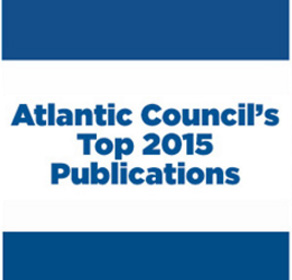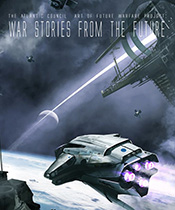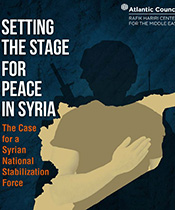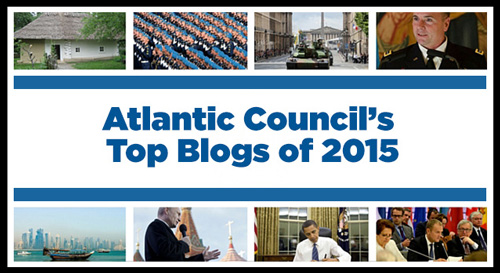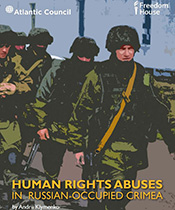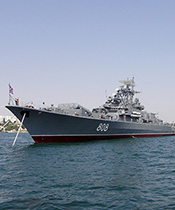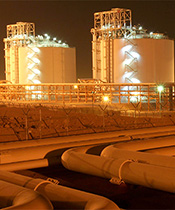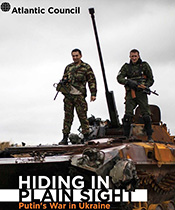
|
Hiding in Plain Sight: Putin’s War in Ukraine
By Maksymilian Czuperski, John Herbst, Eliot Higgins, Alina Polyakova, and Damon WilsonRussia is at war with Ukraine. Russian citizens and soldiers are fighting and dying in a war of their government’s own making. Russian President Vladimir Putin continues to deny Russian involvement in the fighting, but the evidence is overwhelming and indisputable. Drawing upon open source information, Hiding in Plain Sight: Putin’s War in Ukraine provides irrefutable evidence of direct Russian military involvement in eastern Ukraine. |
War Stories from the Future
By Art of Future Warfare ProjectWar Stories from the Future is the culmination of the Atlantic Council Art of Future Warfare project’s first year exploring the future of armed and social conflict. |
|
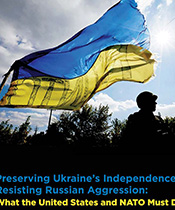
|
Preserving Ukraine’s Independence, Resisting Russian Aggression: What the United States and NATO Must Do
By Atlantic Council, The Brookings Institution, and The Chicago Council On Global Affairs
The Kremlin is waging a hybrid war in Ukraine’s east. Initially covert, Moscow’s intervention became increasingly open when it sent in regular army units in August. Since the Minsk ceasefire, signed in September, Kremlin-supported separatists seized 500 square kilometers of Ukrainian territory. The ceasefire was an illusion. Despite the agreement, Russia continued to send hundreds of tanks, armored personnel carriers, missiles, and artillery into Ukraine. A significant numbers of Russian soldiers are now in the country, with more amassed on the border. |
Setting the Stage for Peace in Syria: The Case for a Syrian National Stabilization Force
By Frederic C. Hof, Bassma Kodmani, and Jeffrey WhiteAfter four years of conflict in Syria, peace is still a distant prospect. The West insists that there is no “military solution,” while Iran and Russia provide the Assad regime with a military advantage obstructing the possibility of real diplomatic negotiations. With over 220,000 Syrians dead and more than half of the Syrian population displaced, the need for peace is critical. |
|
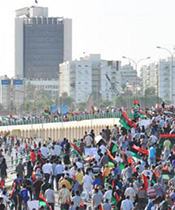
|
Economic Consequences of the Arab SpringBy Mohsin Khan
In a new issue brief, Rafik Hariri Center Senior Fellow Mohsin Khan contends that although political turmoil has dominated economic decision-making in the Arab transition countries and Jordan and Morocco during the last three years, there is some encouraging evidence that these economies will turn around in 2014. |
Human Rights Abuses in Russia-Occupied CrimeaBy Andrii KlymenkoThe “green men” who fanned out across Crimea in early 2014, establishing control over key infrastructure and clearing the way for once-marginal political actors to seize the reins of power, were the vanguard of a forced political change that has led to grave human rights abuses across the Crimean peninsula. |
|
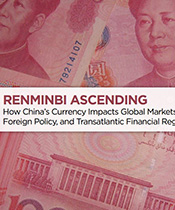
|
Renminbi Ascending- How China’s Currency Impacts Global Markets, Foreign Policy, and Transatlantic Financial Regulation
By Chris Brummer
How will the rise of China’s currency impact global markets, foreign policy, and transatlantic financial regulation? |
The Militarization of Crimea under Russian Occupation
By Andrii KlymenkoIn “The Militarization of Crimea under Russian Occupation,” Crimean activist Andrii Klymenko explains how the Kremlin has moved to tighten its grip on Crimea as the world turns its focus toward Syria. |
|
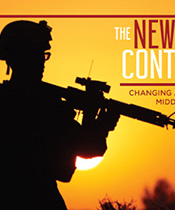
|
The New Containment: Changing America’s Approach to Middle East SecurityBy Bilal Y. SaabSecuring the Middle East after an Iran nuclear deal is the next big challenge for both the region and the international community. The United States and its allies have engaged in tireless diplomacy with Iran over the past few years to produce an agreement that would limit Tehran’s nuclear program for the next decade and a half. However, the hard work does not stop here; in fact, it may have just begun. |
A Post-Sanctions Iran and the Eurasian Energy Architecture: Challenges and Opportunities for the Euro-Atlantic Community
By Dinu Patriciu Center and Global Energy CenterWith the removal of international sanctions on Iran, different markets will have a great interest in importing Iranian gas. But which market will benefit the most? In A Post-Sanctions Iran and the Eurasian Energy Architecture, Micha’el Tanchum, a Nonresident Senior Fellow at the Atlantic Council’s Global Energy Center and the Eurasian Energy Futures Initiative, argues that the lifting of the sanctions carries the potential to radically restructure the Eurasian energy architecture and, as a consequence, reshape Eurasian geopolitics. |
|
